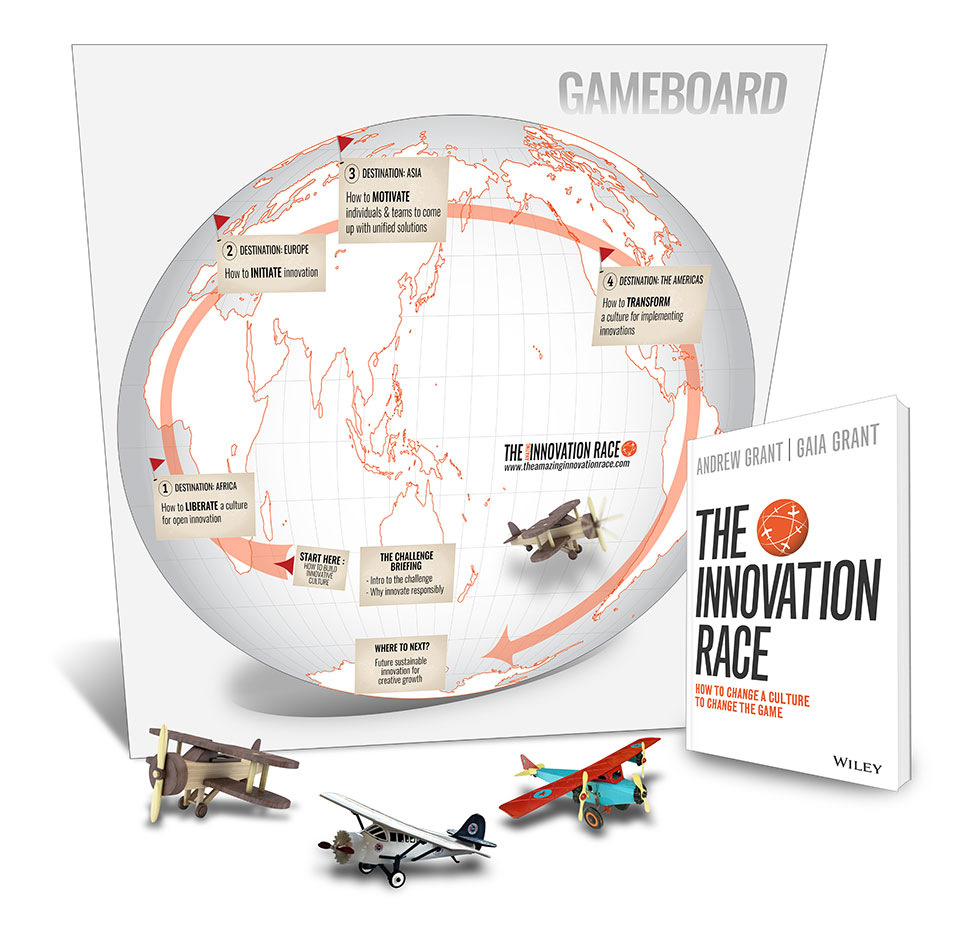The Innovation Race

A fascinating around-the-world tour to learn more about innovation across cultures – and what principles we can use to innovate better.
Why have some great countries and cultures charged ahead at the forefront of innovation, while others have struggled to survive? Who are the most innovative cultures in the world and why? And what does this mean for organizations today and for the race to survive and thrive?
Through drawing out fascinating insights from different cultures around the world this session reveals principles we can all use to improve the way we think about innovation and ultimately change the game. Fast-paced entertainment and humor are blended with deep social and anthropological research, with profound implications for facing contemporary challenges. Along the way participants discover the enduring cultural traits that foster true creative thinking and innovation. They identify how (organizational) culture can shape creative and innovative thinking – and in turn how creative thinking can shape organizational culture for ultimate success.
With a hands on board game-style format, participants in table groups are taken on an around-the-world race. They are required to face some incredible innovation challenges at each destination along the way, and are encouraged to choose the best solutions. Through this process, the participants discover how they can face their own personal, team and organizational challenges in order to create a positive environment for creative thinking and innovation.
Part 1: How to win the innovation race
Tools for creating a competitive advantage
“Why did history unfold differently on different continents? Why did some societies become disproportionately powerful and innovative?” (Diamond). This session explores interesting cross-cultural anthropological principles related to survival through innovation. It culminates in the ultimate question – who wins, and who gets eliminated from the innovation race and why? Parallels are drawn with organization survival and success, identifying the traits of ordinary and extra-ordinary organizations. This session provides clues for truly building a solid culture of innovation through identifying the roadblocks, detours and fast forward strategies to stay ahead of the game.
Part 2: How to create a sustainable culture for innovation
Tools for transformational innovation
How often do we stop to think about how and why we innovate? Are in danger of innovating for the sake of innovating? And what does all this mean for contemporary organizations? This session challenges the typical assumption that innovation is about designing bigger, better, and faster products and services – and suggests, instead, that it should be about creative culture change. By turning the standard ‘success’ paradigm upside down, this session examines the real meaning of progress, and demonstrate how it is possible to transform an organization at the most fundamental levels in a socially responsible way. This session will utilize sensemaking as a theoretical lens for understanding innovation paradox theory.
THE CREATIVE SCENE INVESTIGATION
The Full Suite:
Seven essential strategies for making yourself, your team and your organization more innovative
In the Grants’ first book, keynote and workshop research was predominantly drawn from the fields of neuroscience and psychology to explain the potential blocks to creative thinking and innovation, and to explore what can be done about it. WKC is based on the theme of a Crime Scene Investigation (CSI) which looks at the blocks and enablers from an individual perspective. The participant / reader plays the role of a detective solving a crime and looking for ways to revive creativity. (Wiley 2012 English | Mandarin | Portuguese |Arabic | Audible)
How to create a culture for sustainable innovation?
“Are those who cannot learn from history doomed to repeat it?” In this new book, keynote and workshop, the research is predominantly drawn from the fields of sociology and anthropology. The Amazing Innovation Race is based on the theme of reality TV and looks at what sort of climate fosters or eliminates innovation from a cultural perspective. It also covers how to create an environment that embraces positive change management. The participant / reader discovers the reality that there are no passive viewers in this race, but all are active participants. (Wiley 2016 English)
Some interesting facts from the sessions:
Did you know that…
- CITIES INNOVATE EXPONENTIALLY: A city that is ten times larger than its neighbour isn’t ten times more innovative; it is seventeen times more innovative! A metropolis fifty times bigger than a town is 130 times more innovative.
- INNOVATION SLOWS AFTER INCORPORATION: Innovation slows down by about 40% at tech companies after they go public. Top inventors are much more likely to leave, whilst inventors that stayed behind showed a steep decline in innovation quality.
- DIFFERENT COUNTRIES INNOVATE IN DIFFERENT WAYS:
- Japan was ranked as the most creative country while, conversely, Japanese citizens largely do not see themselves as creative.
- In Scandinavian countries, creativity is seen as an individual attitude which helps in coping with life’s challenges.
- In Germany, creativity is seen more as a process that can be applied to help solve problems
- Cross-cultural research centred on Hong Kong found that Westerners view creativity more in terms of the individual attributes of a creative person, such as their aesthetic taste.
- Chinese people view creativity more in terms of the social influence of creative people e.g. what they can contribute to society.
- Out of 28 African languages, 27 had no word which directly translated to ‘creativity’.
- Places with higher levels of religiosity have lower rates of scientific and technical innovation.
- “One of the keys to sustained performance lies in understanding how greatness can be lost.” Jim Collins:


